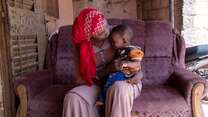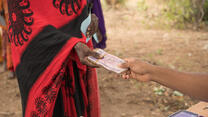In 2012 the International Rescue Committee (IRC), the World Bank, and Innovations for Poverty Action (IPA) partnered to implement and compare two livelihoods programs for 542 young women in urban Kenya. One program focused on equipping young women to start a franchise (called Girls Empowered by Micro-franchise, or GEM), and the other provided cash grants which the women could use for any purpose. Researchers measured the cost-effectiveness of each program in terms of short-term changes in self-employment, work hours, and income.
The micro-franchise program cost substantially more than providing cash grants. Girls Empowered by Micro-franchise (GEM) cost $878 per client served, while distributing cash grants cost US $310 per client served (including the cash distributed).
GEM required more direct delivery staff, monitoring, and materials than the cash program. The cash grants were more cost-effective than business grants at increasing short-term income and self-employment among young women. Being that it had slightly higher impact at a lower cost, the cash program was more cost effective than microenterprise for achieving short-term gains in income and employment.



